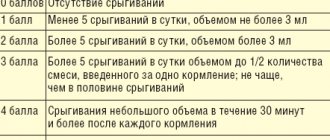Many parents notice that their children become more capricious as they approach one year of age. Usually they refuse to eat or sleep, cry, are stubborn about little things, do not let their mother leave their side, etc. What is the reason for such changes? All this is a child’s 1 year crisis. It begins around the age of ten months and can last almost six months, and sometimes a year. It is not at all difficult to determine the first age crisis in a baby, since it has a number of its own characteristics and signs. But moms and dads shouldn’t worry about the strange behavior of their beloved child at all. You don’t need to think that this is how the baby wants to show his character. This is just one of the periods in the life of every little one. And your primary task is to help your child cope with all the difficulties of this transitional moment.
- 2 Signs of a crisis
- 3 Causes of the problem
- 4 Duration
- 5 How to cope: advice from psychologists
- 6 What not to do
- 7 Should you be afraid of the crisis of the first year?
- 8 Video: “Naughty children” - Komarovsky
What is the first year crisis?
Periods of time when a child’s behavior and habits change are an integral part of a child’s growing up. And they are called age-related or personality crises. Throughout life, such crises are repeated regularly. In childhood, this occurs in the first weeks after birth, at 1 year, at three, at six and at 12–14 years.
Age crises in children: causes, signs, what to do
Sooner or later, the child has new needs, and what was used to satisfy them before ceases to be relevant. This is the crux of the problem.
It is at the age of 1 year (plus or minus 1–2 months) that the baby takes his first steps and begins to actively explore the world around him. But his aspirations and impulses are most often limited by his parents’ categorical “no!” This causes tears, whims, and stubbornness.
Remember the root cause of world revolutions: “The lower classes cannot, but the upper classes do not want”? The situation is approximately the same here. Moms and dads must realize that their baby has grown up, become more independent, sociable and mobile, and begin to treat the baby differently. But how can you understand that a crisis has already set in for a one-year-old toddler?
How it manifests itself
The most difficult thing is to recognize the crisis of the 1st year, because psychological maturation, like physiological maturation, is purely individual. The name is conditional: in some children its manifestation is observed as early as 8 months, while others can only achieve this at 15 months. This usually occurs within 3-4 weeks after the child begins to walk. And here it is important to notice the signs that indicate the beginning of the formation of a personality.
The main manifestation of the first age crisis is hypobulic reactions. In psychology, this concept refers to pronounced emotions based on dissatisfaction. A ban on what he wants or simply its physical unattainability gives rise to aggression in a child, he enters a short-term state of affect and stress and demands by any available means what he needs. These outbreaks are characterized by:
- loud crying, but most often without tears (they can come later, when the state of passion ends, and the child does not get what he wants, and this will be a different reaction - disappointment and resentment);
- sudden movements: waving your arms, stamping your feet, shaking your head, maybe even falling backwards;
- lively facial expressions: frowning eyebrows, tightly compressed lips, narrowed eyes;
- demanding intonations: adults may not understand baby babble, but the dissatisfied tone and fast pace of speech will make it clear that the baby is demanding something and is angry.
Hypobulic reactions can occur at different times. Most often, their reason lies on the surface and is quite understandable to adults. For example, a child is not given a toy or is forced to eat bland porridge instead of tasty candy. But sometimes the provoking factor is veiled and it is not so easy to recognize what exactly he does not like. This could be childish jealousy (when someone kisses the mother or she actively communicates with someone else in front of the baby) or lack of attention (adults are busy with their own affairs, and he must entertain himself).
Hypobulic reactions most often occur violently, with hysterical notes. However, attentive parents against their background may also notice more mitigated manifestations of the crisis:
- curiosity: the baby is drawn to everything forbidden - sockets, electrical appliances, open windows, doors;
- excessive activity, restlessness;
- resistance to mother’s actions (milder than with hypobulic reactions) - for example, persistently tearing the hat off the head;
- importunity: crawls (walks) on mom or dad’s heels, doesn’t lag behind even for a minute, doesn’t even let you go to the toilet, pulls clothes, tries to say something and demands an answer;
- refusal of habitual rituals (not necessarily through hypobulic reactions): does not want to sleep, eat, walk, wash, get dressed, etc.
Most often, the child experiences the first psychological crisis quite violently, because he does not yet have the ability to self-reflect. He demonstrates all his emotions in order to convey his feelings and contradictions to adults. Unfortunately, most parents attribute these whims to illness or, even worse, to a bad character (young mothers often say phrases like “harmful - just like dad”).
This leads to the fact that in terms of psychological development the baby is left without help, which subsequently negatively affects his formation as a person. Unresolved contradictions can follow him for a long time, preventing further normal socialization.
Conclusion three. There is no need to attribute changes in a child’s behavior to teething or manifestations of character. The main thing is to realize in time that these are the first signs of a crisis and take all necessary measures to overcome it.
Signs of a crisis
- Disobedience, stubbornness. The kid is confident that he can always do everything on his own. And when he is contradicted and forbidden, he categorically refuses to obey.
- Frequent mood changes. Karapuz expresses dissatisfaction with almost everyone and everything. The reaction to certain situations changes radically, and aggression appears.
- Contradictory behavior. It is expressed in the fact that first the baby hugs and then hits someone or first begs for a toy and then throws it away.
- Vulnerability, touchiness. The child often cries and is capricious. It is often difficult to calm him down, because the reason for his tears is almost impossible to find.
- Fear of losing mom out of sight. These one-year-old toddlers are most often called “mom’s tail.”
- The child constantly requires attention. It is important for him to be watched and played in his games. The baby begins to be jealous.
Children 1-2 years old
It seems that just yesterday the child was a sweet angel, but today he has become whiny and capricious. Hello, one year crisis. Often this is what causes changes in the baby’s behavior.
This is the first age-related crisis of a child that parents face. It starts at about a year and a half, and ends by 2 years. Psychologists characterize this period as the beginning of the formation of one’s own “I”.
The baby little by little begins to realize that he is an autonomous person. He develops goal-setting when “I want” develops into “I need to achieve it.” In any way - sometimes with screams and hysterics. The child actively explores the world - when for one reason or another he is forbidden to do this, whims become a way to achieve what he wants. And yes, the baby learns to manipulate his parents. He observes their reactions to his various actions, probes the boundaries of what is permitted. It is important not to miss the moment when “real” whims develop into a method of emotional blackmail.
But don’t forget that even now a child can be capricious and freak out for completely “banal” reasons - he’s overtired or sick.
Causes of the problem
Now let’s take a closer look at the reasons for this behavior. A feature of the first year of life of any child is that he develops comprehensively - both mentally and physically. He actively studies the world around him. At 10–12 months he can already pick up and hold things that were previously inaccessible to him. Takes his first steps.
Therefore, the baby believes that he is an adult, independent, and can completely do without the intervention of adults, and any prohibitions cause him only indignation. Which can be called the first reason for the crisis of 1 year.
This manifests itself when the baby persistently tries to eat on his own, and the parents do not support him in good endeavors. Or when he wants to walk without assistance, but his mother does not let go of his hand.
Adults continue to behave with their grown-up children in the same way as before. And when faced with resistance and aggression, they often behave completely incorrectly: they get angry, scream, and sometimes use force. Here is the second reason for the crisis.
Hence the conclusion - a child is capricious in the first year because he has grown up, his needs and capabilities have changed, and parents also need to readjust and start treating the baby differently, giving him more freedom and respecting his personality.
The whims have begun: what should parents do?
Even the most obedient kids get capricious and freak out. This is fine. And there is no universal recommendation that would help instantly extinguish a child’s hysterics. After all, the reasons for whims themselves may be different.
With babies aged 6 months, everything is more or less clear. You need to pull yourself together and calm the baby. Here everyone copes as best they can - rocks, sings a song, gives a favorite toy or rodent to relieve pain in the gums. If necessary, feed, drink and put to bed. “Bad days” happen even to young children - most likely, tomorrow the child will be in a better mood, he will not be capricious, freak out and cry.
But starting from the age of one year, the “pump and feed” techniques will no longer work. How to cope with the situation and quickly extinguish whims?
Switch the child's attention
Perhaps the baby did not plan anything bad - he began to be capricious and freak out because he was tired or bored. Try to switch his attention to something else. Works flawlessly with children 1-2 years old.
Has your child started acting up in the store? Distract him with a toy (be sure to put it in your bag). Or involve your child in helping - let him get food from the lower shelves.
Use reasonable arguments
If your child suddenly goes crazy, try to come to an agreement with him. After 3 years, he is quite capable of understanding that “wrong” behavior can be followed by punishment. It's time to learn how to negotiate peacefully with your child.
Of course, we will do without threats and severe punishments. We calmly explain why exactly “no” and “impossible.” Most likely, a capricious child listens to reasonable arguments when tearfulness is periodic in nature.
If necessary, we promise to do what he wants another time. By the way, the promise will have to be fulfilled so as not to shake the baby’s trust. Otherwise, next time it will not be possible to extinguish his whims.
Recourse to the help of the “hall”
A great way to distract a 1-2 year old child from his own whims is to call a friend, a “figurehead,” for help.
We take the baby’s favorite toy and say: “I’m very sad. Let's go for a walk". Most likely, the child will forget that he cried. Of course, he understands that this is mom. But he will certainly enjoy this performance.
Act on the contrary
A three-year-old suddenly has an “attack” of negativism, is he capricious and freaking out, as happens during an age crisis? When he says “no” to everything, try doing the opposite.
If you want to go right, say left. Most likely, the baby will begin to walk to the right. And when you need to feed your child meat, tell him that he can’t have that delicious piece at all. He'll probably eat it with pleasure. From time to time, when the situation allows, you can cope with children's whims in this way.
Suppress a child’s negative emotions with a comic fight
If a child throws a tantrum or is naughty at home, you can offer him a comic fight with pillows or soft toys. A great way to release stress and negative emotions is to channel your anger into a peaceful channel.
Don't leave the child alone
When a child is capricious and freaks out, emotions go through the roof - it seems that it is no longer possible to tolerate it. Find the strength to stay close and talk to your child. Don't leave him alone with stress.
Hug, hold close. Tell him you understand him. Explain once again the prohibition or, conversely, the need to do something. If this does not calm the fussy child, stay in the room nearby. Surely the grievances will soon pass.
Don't lose self-control
Parental screams and strict punishments will not help cope with children's hysteria. This is how you show your baby that you are completely helpless in front of his whims. And it doesn’t matter how old he is - a year or already five.
First you need to deal with your own nerves. Leave the room, calm down. Then you can solve the problem - with persuasion, a heart-to-heart conversation, or distraction.
- share with your friends!
How to cope: advice from psychologists
Some parents put up with their children becoming moody and continue to indulge them even as they get older. The rest, on the contrary, refuse to come to terms with the current circumstances and use not entirely popular measures against children. Nevertheless, there are methods that, from the point of view of psychologists, are correct and not so complicated, with the help of which you can come to an agreement with a protesting child.
- Eliminate unnecessary inhibitions as much as possible. Let there not be so many of them. In order not to forbid your child to take this or that thing every time, simply move these things to an inaccessible place.
- If your baby shows initiative and tries to do something on his own, don’t stop him.
- If your baby doesn’t want to eat, don’t force him, just offer him. When he gets hungry, he will definitely eat.
- Learn to understand your little one and be attentive to his requests and desires. Although he does not yet know how to express his thoughts, his mother will probably intuitively feel them.
- Parents should be their child's best friends, not strict educators, so spend more time with your baby - crawl with him, play with the toys he offers.
- Constantly communicate with the baby. After all, this is important not only as a manifestation of attention, but also as an aspect of speech development. Talk to him about everything in the world - tell him about what you are doing now, what you plan to do, ask his opinion.
- Involve your child in daily activities. Be sure that he will be interested in it. And even more so, if he hears praise addressed to him, he will definitely help you next time. Ask him for help.
- If the baby cries incessantly and cannot be calmed down with all kinds of persuasion, leave him alone, but not for long. When he realizes that his parents do not pay any attention to the manifestations of his character, he will almost immediately switch to another activity.
Allow or deny?
The baby begins to use tears and screams in order to achieve the desired result. In psychology, this is called manipulative crying. Of course, this unsettles the parents; they are ready to do anything to stop these heartbreaking screams.
However, manipulative crying is a necessary and natural stage in the development of a little person. In this way, he tests how strong the social framework is and what can be achieved by crying. The baby must have some prohibitions and limits on his desires. Permissiveness is difficult not only for parents, but also for the child himself. However, there must be clear logical grounds for any prohibitions. Prohibitions may concern things that pose a danger to life and health; they may be related to your work or something that is very dear to you.
If there are too many prohibitions, some of them are no longer observed. In this case, it is quite possible that the child will decide to violate exactly the prohibition that will be the most important for you. It is much easier to regulate a child’s behavior by simply removing prohibited things from his sight.
The famous English psychoanalyst Winnicott noted that if a mother left a bag of buckwheat on the floor and an eight-month-old child immediately scattered it, the mother, rather than the child, should be blamed for this. Winnicott advises that the drawers accessible to the baby should contain only those things that he is allowed to touch. You can even leave some “safe” drawers open. In this case, the child is unlikely to have a need to climb into the sideboard with your ceremonial service.
What not to do
There are also a number of taboos that should never be neglected during this difficult period:
- You cannot put pressure on a child and show that you are older and stronger, you must be a friend and protector for him.
- There is no need to forbid the little one to show independence, otherwise, as he becomes more mature, he will continue to hope for your help.
- There should be a minimum of prohibitions, but there is no place for permissiveness here either.
- Parents, as well as all relatives and friends who communicate with the baby, must adhere to the same pattern of relationships with him, so that situations do not arise when the mother forbids him what the grandmother allows, for example.
- The child should be given a sufficient amount of attention, but you do not have to spend all your time with him. Parents must be able to clearly explain to the child that they have other things to do.
- At this age, children repeat everything after adults, so do not allow yourself to show your bad sides in the presence of a child.
- You cannot shout at the baby or hit him, although during this period it is difficult to cope with his whims.
- Distract the baby from problems, but do not give the little whimsical sweets for any reason and do not pick them up on demand.









